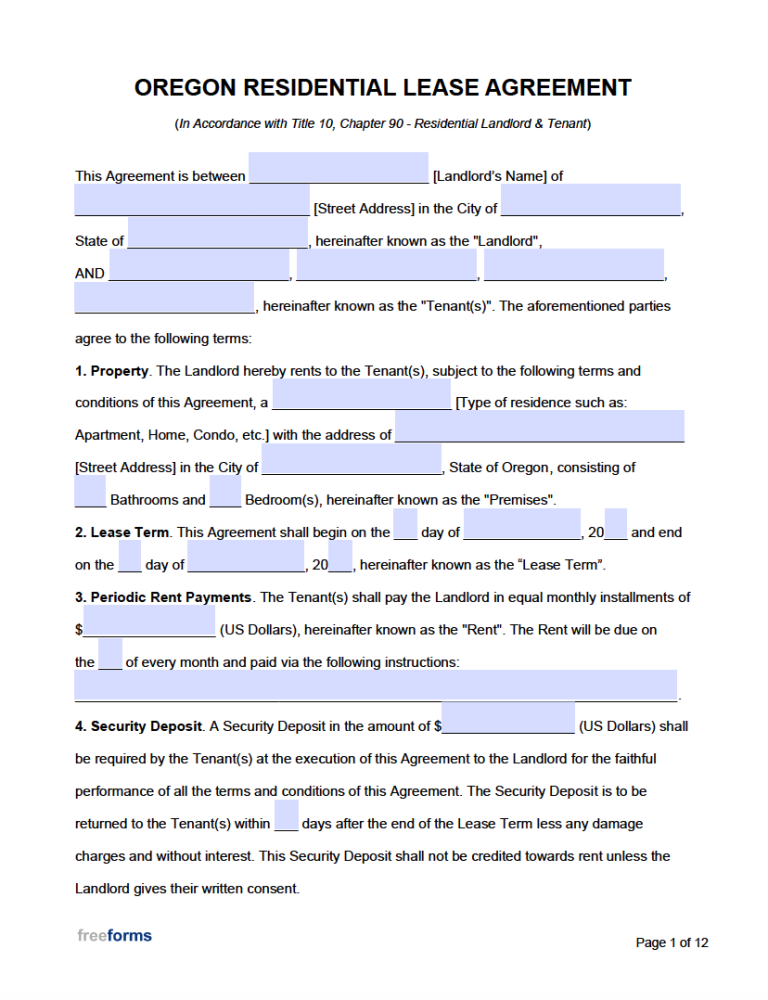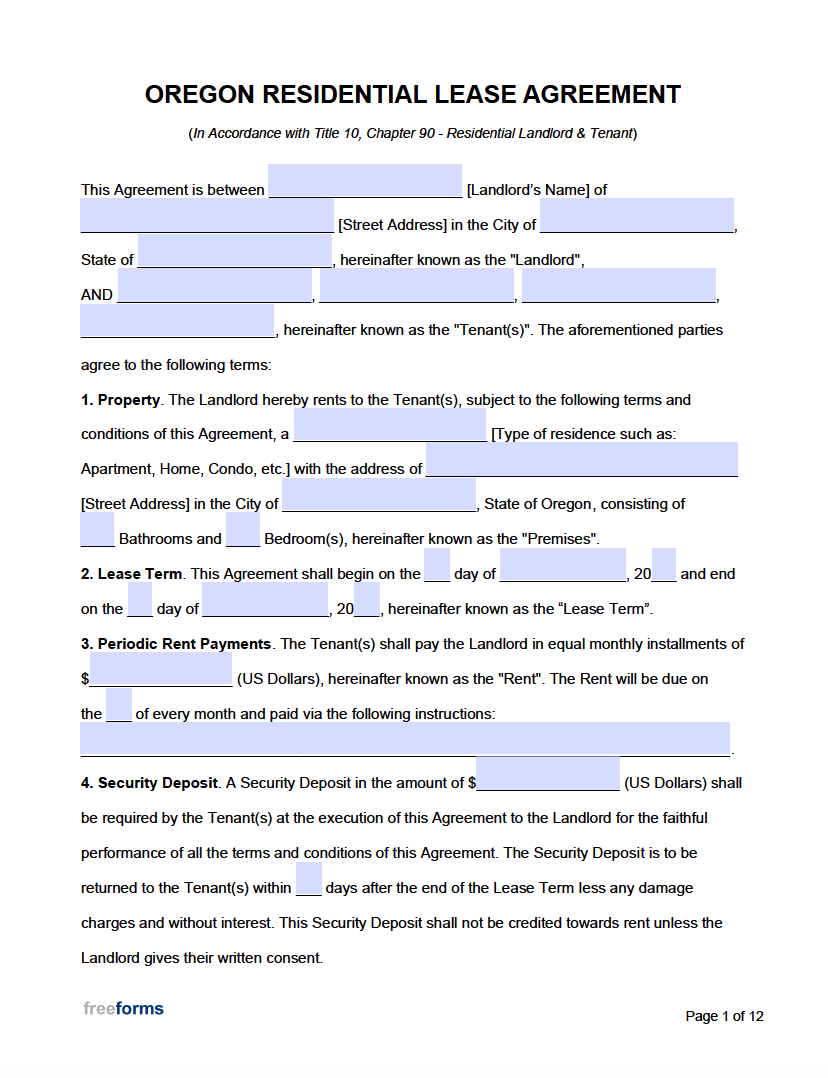Lease Agreements By Type
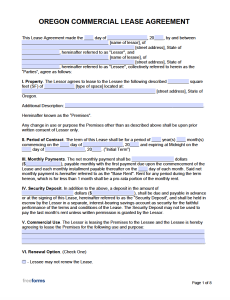 Commercial Lease Agreement – Corroborates the conditions of a contract designed to lease real estate to a business.
Commercial Lease Agreement – Corroborates the conditions of a contract designed to lease real estate to a business.
Download: PDF, Word (.docx)
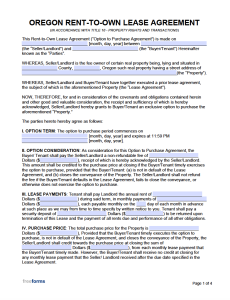 Lease to Own Agreement – Publishes a lease arrangement for residential use with the possibility to buy the home at the end of the leasing term.
Lease to Own Agreement – Publishes a lease arrangement for residential use with the possibility to buy the home at the end of the leasing term.
Download: PDF, Word (.docx)
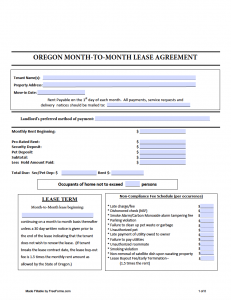 Month-to-Month Lease – Interprets the contract involving the rental of a residence with the option to end the lease early with thirty (30) days of notification to the other party.
Month-to-Month Lease – Interprets the contract involving the rental of a residence with the option to end the lease early with thirty (30) days of notification to the other party.
Download: PDF
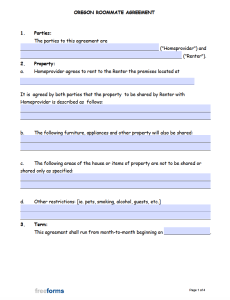 Roommate Agreement – Adapts a lease agreement to be used with an individual that will dwell in a home with shared and private areas.
Roommate Agreement – Adapts a lease agreement to be used with an individual that will dwell in a home with shared and private areas.
Download: PDF
Standard Lease Agreement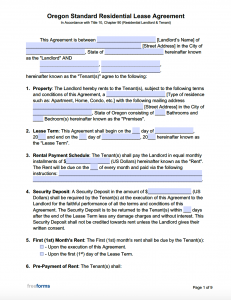 – Documents the specifics of a general leasing arrangement, including facts surrounding the involved parties, terms, and conditions.
– Documents the specifics of a general leasing arrangement, including facts surrounding the involved parties, terms, and conditions.
Download: PDF, Word (.docx)
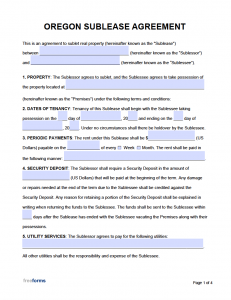 Sublease Agreement – Clarifies the settlement for a lessee to grant the right of use of a property to an alternate tenant.
Sublease Agreement – Clarifies the settlement for a lessee to grant the right of use of a property to an alternate tenant.
Download: PDF, Word (.docx)
Additional Forms
HOME Lease Compliance Form – Required for tenants who have signed up with the HOME Program.
Pet Addendum – Registers the particulars surrounding a domesticated animal that will be living on the leased premises.
Landlord-Tenant Laws
You can refer to the source materials made available in the Oregon Revised Statutes – Chapter 90 – Residential Landlord and Tenant to further probe the legalities pertaining to the accepted residential leasing observances.
Required Landlord Disclosures
Identification of the Landlord or Authorized Personnel (§ 90.305) – Information regarding the name and address for all owners and managing operatives must be stated in the lease materials.
Provided Recycling Services (§ 90.318) – Rental homes consisting of more than 4-units within a city or district, actively initiating multifamily recycling services, must furnish receptacles for tenants to do so. Management must notify residents once per year of the option to recycle, as well as how to and where to recycle on the property.
Carbon Monoxide Alarm (§ 90.316) – Residences either equipped with a carbon monoxide source, built after 2011, or renovated with the prerequisite of a building permit will require working carbon monoxide alarms in all units. The potential tenant must additionally be informed that tampering with any installed alarm units is not allowed via the provided disclosure form.
Notice of Residence Smoking Policy (§ 90.220) – Information referring to the policy of smoking within the dwelling or property confines must be reported in the leasing agreement.
Shared Utility Service (§ 90.315) – The portion of services that are to be paid by the tenant must be outlined in the lease arrangement and presented before contract execution. Documentation of each utility provider and amounts or percentage costs must be established in order to be sanctioned.
Lead-Based Paint (42 U.S. Code § 4852d) – Properties built in 1978 or earlier require an additional responsibility of administering information about the hazard posed by exposure to lead-based paints. The paint in older homes may constitute a possible threat to tenants, and disclosure of the risk must be presented before lease endorsement.
Notice of Current Legal Proceedings Associated with the Property (§ 90.310) – For habitations where there are fewer than five units, any current or pending financial default or legal proceeding must be disclosed to the tenant before entering into a leasing contract.
Notification of Property in 100-Year Floodplain (§ 90.228) – Residences that lie within an area categorized as a floodplain zone are to be disclosed as such to any possible tenant. Should the dwelling’s flood zone status not be indicated prior to signing a lease agreement, the landlord can be liable for any resulting flood damage.
When is Rent Late?
The state-observed grace period for late rental payment is acceptable for up to four (4) days past the due date. If payment is delivered after the fourth day, additional late fees could apply (§ 90.260).
Late Fees
Should a monthly rental premium be supplied after the allowable grace period, a late fee can be charged if defined explicitly in the lease agreement. The amount charged must be classified as “reasonable” which is determined as the typical amount charged by a landlord in the market area. If a late charge is coupled with a per-day fee after that, it is not to exceed 6% of the initial late charge. For fees adhering to a per-five-day schedule after the initial late fee, subsequent fees can not be more than 5% of the total rental payment amount (§ 90.260).
NSF Checks
Checks received by an owner returned for insufficient funding may warrant a fee if it is included in the leasing documentation. The fee for each instance cannot surpass $35 in addition to any fee charged by the bank (§ 30.701)
Security Deposit Maximum
Oregon does not promulgate a limit on the amount that an owner can supplicate as a monetary deposit to secure the condition of the property.
Security Deposit Return
Once the term of the lease has come to an end, the landlord has a total of thirty-one (31) days to supply the former tenant with financial reimbursement of the security deposit. For cases involving defects to the residence caused by the tenant, the owner can submit a supplementary listing of damages and costs to repair along with the remainder of the deposit (§ 90.300).
Landlord’s Entry
When necessary, if a lessor or contracted worker must enter the premises, at least twenty-four (24) hour advance notification is obligated to be given to the tenant. The notice is also required to include the reason for entry, requested date and time, as well as names of those who gain access to the property (§ 90.322).


